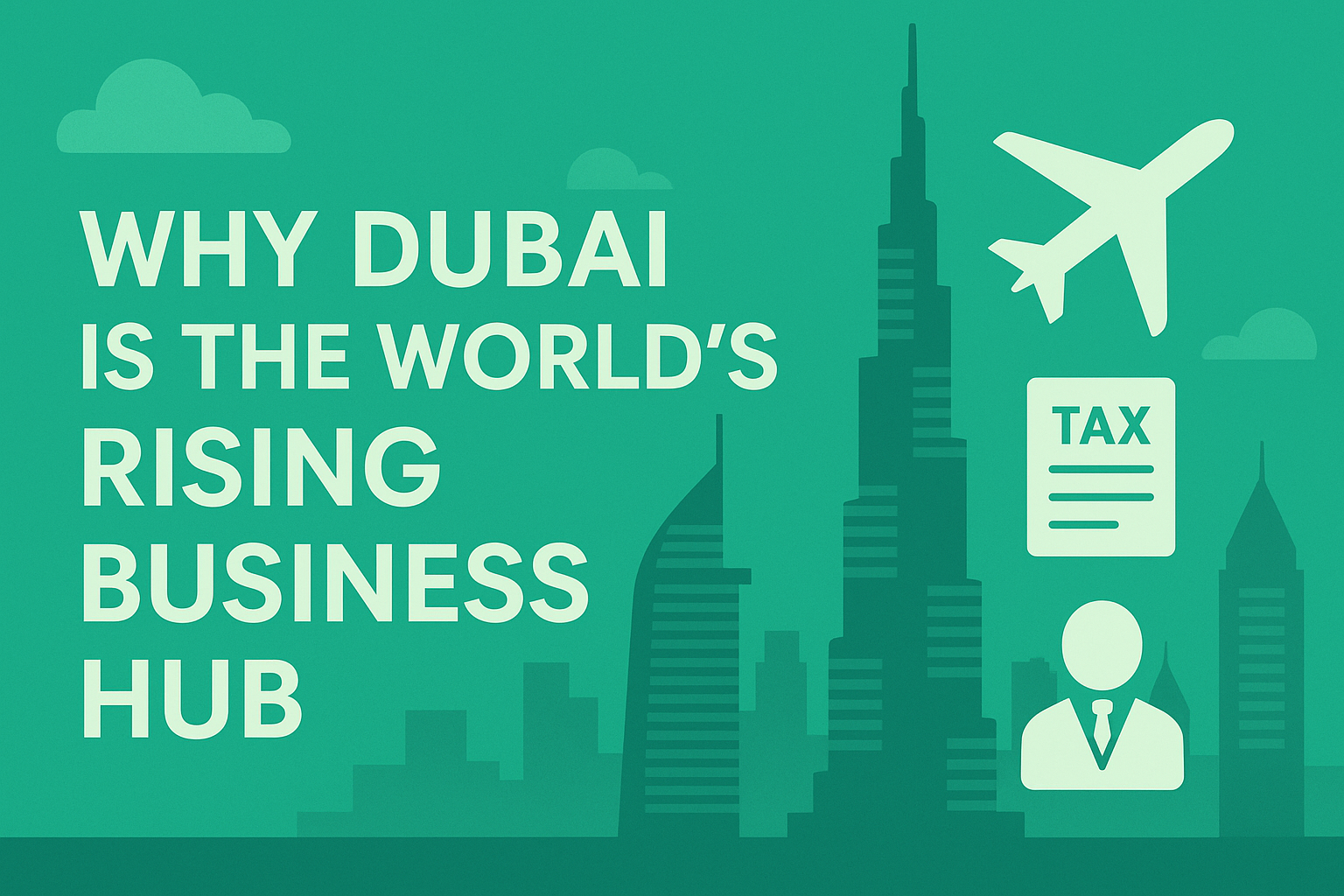—An Economist’s Perspective—
Executive Summary
Dubai has evolved into one of the world’s most attractive business hubs, combining strategic geography, tax efficiency, flexible regulation, and world-class infrastructure. The emirate serves as a natural gateway between Asia, Europe, and Africa, with unmatched air connectivity, advanced logistics, and a stable currency pegged to the US dollar. Beyond its role as a transport hub, Dubai has positioned itself as a financial, commercial, and innovation center, leveraging free zones, modern legal frameworks, and pro-investor residency schemes.
1. Strategic Location and Connectivity
- Geographical advantage: Within four hours’ flight of one-third of the global population, and eight hours’ flight of two-thirds. This time-zone positioning enables 24/7 global operations.
- Air and sea hubs: Dubai International Airport (DXB) is consistently among the world’s busiest for international passengers (~92 million in 2024). Jebel Ali Port remains the largest container terminal in the Middle East, processing over 15 million TEU annually.
- Global reach: Dubai serves as a springboard into the Middle East, Africa, South Asia, and beyond, making it ideal for companies seeking expansion into emerging markets.
2. Tax and Regulatory Advantages
- Corporate taxation: Standard corporate tax of 9% introduced in 2023, aligned with OECD requirements. Crucially, qualifying free zone entities (QFZPs) continue to benefit from a 0% tax rate on eligible income, preserving Dubai’s competitiveness.
- Personal taxation: No personal income tax, no capital gains tax, and only a 5% VAT. This regime makes Dubai highly attractive for entrepreneurs, executives, and expatriates.
- Global minimum tax compliance: For multinational groups exceeding €750 million in revenue, the UAE applies a 15% domestic top-up tax (DMTT), maintaining alignment with international standards while safeguarding reputation.
- Free zones: Over 30 specialized free zones, including DIFC (finance), DMCC (commodities), and Dubai Internet City (tech), provide tailored regulatory ecosystems with 100% foreign ownership, profit repatriation, and streamlined licensing.
3. Legal and Institutional Framework
- DIFC courts: Based on English common law, offering international-standard dispute resolution and legal certainty for cross-border investors.
- Independent regulators: Bodies such as the DFSA (Dubai Financial Services Authority) and VARA (Virtual Assets Regulatory Authority) enhance credibility and innovation in finance and digital assets.
- Data protection: GDPR-aligned DIFC data protection laws ensure compliance with global privacy requirements, facilitating international business transactions.
4. Talent and Residency Policies
- Visa flexibility: Dubai offers 5- and 10-year Golden Visas for investors, entrepreneurs, and highly skilled professionals, enhancing workforce stability.
- Expatriate workforce: Foreign nationals make up nearly 90% of the population, creating a cosmopolitan labor market with high English proficiency and diverse skills.
- Ease of living: High-quality healthcare, international schools, and a cosmopolitan lifestyle make Dubai attractive for relocating executives and their families.
5. Infrastructure and Innovation Ecosystem
- Digital economy focus: Initiatives like Dubai Internet City and Dubai Silicon Oasis foster start-ups and tech innovation.
- Finance and fintech: The DIFC hosts over 7,000 firms, including global banks, asset managers, and fintechs.
- Virtual assets leadership: With the establishment of VARA in 2022, Dubai became the first global jurisdiction with a comprehensive regulatory framework for cryptocurrencies and Web3.
- Sustainability: Dubai is investing in clean energy (Dubai Clean Energy Strategy 2050) and sustainable infrastructure, supporting ESG-driven firms.
6. Risks and Considerations
- Banking and compliance: Corporate bank account opening can take weeks due to strict AML/KYC checks; companies must prepare robust documentation.
- Living costs: Rising housing, schooling, and healthcare costs can affect long-term affordability for expatriates.
- Regulatory evolution: While the tax regime remains light, ongoing global reforms (OECD Pillar Two, AML standards) may gradually increase compliance costs.
- Competition: Neighboring hubs like Abu Dhabi, Riyadh, and Doha are strengthening their business ecosystems, intensifying regional competition.
7. Conclusion
Dubai’s appeal as a business hub lies in its unique mix of geography, regulatory flexibility, tax efficiency, and cosmopolitan ecosystem. For global headquarters, regional expansion, or capital-raising functions, Dubai offers one of the most compelling environments worldwide.
In practical terms:
- Global HQ / Capital Management → Dubai (DIFC, DMCC)
- Tech / Innovation Expansion → Dubai Internet City, Dubai Silicon Oasis
- Trade / Logistics → Jebel Ali + Free Zones
Dubai’s strategic trajectory suggests it will continue to consolidate its role as the gateway between East and West, with strong resilience to global economic shifts.


